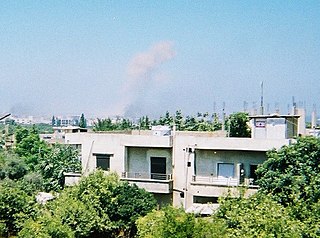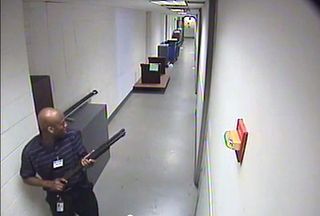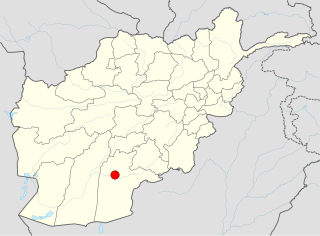Related Research Articles

An active shooter is the perpetrator of an ongoing mass shooting. The term is primarily used to characterize shooters who are targeting victims indiscriminately and at a large scale, who oftentimes, will either commit suicide or intend to be killed by police. More generally, an active perpetrator of a mass murder may be referred to as an active killer.

The 2007 Lebanon conflict began when fighting broke out between Fatah al-Islam, an Islamist militant organization, and the Lebanese Armed Forces (LAF) on May 20, 2007 in Nahr al-Bared, a UNRWA Palestinian refugee camp near Tripoli.

In the United States, a common definition of terrorism is the systematic or threatened use of violence in order to create a general climate of fear to intimidate a population or government and thereby effect political, religious, or ideological change. This article serves as a list and a compilation of acts of terrorism, attempts to commit acts of terrorism, and other such items which pertain to terrorist activities which are engaged in by non-state actors or spies who are acting in the interests of state actors or persons who are acting without the approval of foreign governments within the domestic borders of the United States.
The timeline of some of the most relevant events in the Mexican drug war is set out below. Although violence between drug cartels had been occurring for three decades, the Mexican government held a generally passive stance regarding cartel violence through the 1980s and early 2000s.

A mass shooting is a violent crime in which one or more attackers use a firearm to kill or injure multiple individuals in rapid succession. There is no widely accepted specific definition, and different organizations tracking such incidents use different criteria. Mass shootings are generally characterized by the targeting of victims in a non-combat setting, and thus the term generally excludes gang violence, shootouts and warfare. Mass shootings may be done for personal or psychological reasons, such as by individuals who are deeply disgruntled, seeking notoriety, or are intensely angry at a perceived grievance; though they have also been used as a terrorist tactic, such as when members of an ethnic or religious minority are targeted. The perpetrator of an ongoing mass shooting may be referred to as an active shooter.

The Kandahar massacre, also called the Panjwai massacre, was a mass murder that occurred in the early hours of 11 March 2012, when United States Army Staff Sergeant Robert Bales murdered 16 Afghan civilians and wounded six others in the Panjwayi District of Kandahar Province, Afghanistan. Nine of his victims were children, and 11 of the dead were from the same family. Some of the corpses were partially burned. Bales was taken into custody later that morning when he told authorities, "I did it".
Livestreamed crime is a phenomenon in which people publicly livestream criminal acts on social media platforms such as Twitch or Facebook Live.
This section of the timeline of United States history includes major events from 2010 to the present.
A mass stabbing is a single incident in which multiple victims are injured or killed with a sharp object thrusted at the victims, piercing through the skin and injuring the victims. Examples of sharp instruments used in mass stabbings may include kitchen knives, utility knives, sheath knives, scissors, katanas, icepicks, bayonets, axes, machetes and glass bottles. Knife crime poses security threats to many countries around the world.

On August 3, 2019, a mass shooting occurred at a Walmart store in El Paso, Texas, United States. The gunman, 21-year-old Patrick Wood Crusius, killed 23 people and injured 22 others. The Federal Bureau of Investigation investigated the shooting as an act of domestic terrorism and a hate crime. The shooting has been described as the deadliest attack on Latinos in modern American history.
On November 17, 2019, a mass shooting occurred at a Fresno, California football watch party with 35 to 40 attendees where four people were fatally shot and six others were injured.

On April 18 and 19, 2020, 51-year-old Gabriel Wortman committed multiple shootings and set fires at sixteen locations in the Canadian province of Nova Scotia, killing twenty-two people and injuring three others before he was shot and killed by the Royal Canadian Mounted Police (RCMP) in the community of Enfield. The attacks are the deadliest shooting rampage in Canadian history, exceeding the 1989 École Polytechnique massacre in Montreal, where fourteen women were killed.
This is a timeline of ISIL-related events that occurred in the year 2020.

An Islamist insurgency has been ongoing in the Sahel region of West Africa since the 2011 Arab Spring. In particular, the intensive conflict in the three countries of Mali, Niger and Burkina Faso has been referred to as the Sahel War.
References
- 1 2 3 4 Trew, Bel (April 22, 2020). "Several dead in Lebanon's 'largest mass shooting' in years". The Independent .
- 1 2 Azhari, Timour (21 April 2020). "Several dead in 'indiscriminate' Lebanon mass shooting". Al Jazeera English .
- 1 2 "Alleged shooter in Lebanon's largest civilian attack apprehended". Middle East Monitor . April 23, 2020.